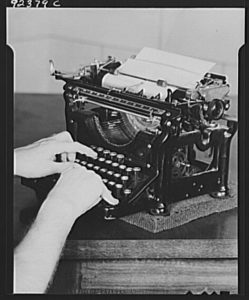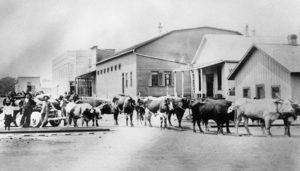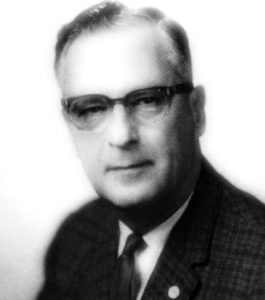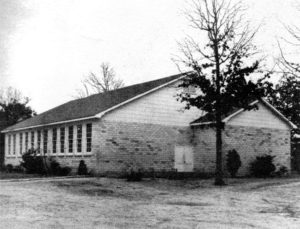calsfoundation@cals.org
A Vision: An Encyclopedia by All, for All
 Do you have the right to write for the CALS Encyclopedia of Arkansas?
Do you have the right to write for the CALS Encyclopedia of Arkansas?
I’ve had occasion recently to visit with some of the people who were on the ground floor of creating the Encyclopedia of Arkansas in the early 2000s (I did not join the staff until 2005). Amid general discussion about what they envisioned for the EOA, and how it all ended up, I learned about a debate that preceded my arrival—a debate about who should be allowed to write for the EOA.
One of the first things founding editor Tom Dillard and others did to lay the groundwork was establish separate oversight and editorial boards in order to rope in a range of Arkansas history experts to help create standards for operations and criteria for entry inclusion. Some of these board members hailed from state media, government agencies, businesses, or local historical societies, but a large number of board members were drawn from the ranks of university professors here in Arkansas.

And so, on the question of what sort of people would be allowed to write entries for the EOA, there was a significant contingent on the boards who believed that only trained historians should be permitted, as this would give the project greater credibility within the academic world. However, the incipient EOA staff and others in the Central Arkansas Library System pushed back on this idea, emphasizing the reality that 1) relying solely upon “credentialed” historians would greatly limit the coverage the EOA could offer of various topics, given that many such historians were not researching, for example, the small towns of Chicot County, not to mention the fact that most credentialed historians were white and male, and so relying only upon them might well skew the content of the EOA, and 2) significant work in both history and historical preservation in Arkansas has been carried out by distinctively non-credentialed individuals.
Fortunately, the voices for inclusion won out, and so not only is EOA content available for the wider world, but so is participation in the project, no matter one’s level of expertise. In fact, we rather pride ourselves on working with authors who have no background in historical research, directing their attention to the resources available here at CALS or wherever they might find themselves. Likewise, I’ve often communicated with people who are self-conscious about their writing ability, and each time I tell them that if they can just put down the facts in order, I can edit it all together, no problem.

We’ve had high school students write for us. Our youngest author, Conor Hennelly, started out as an intern/volunteer, and wrote his first entry for us, on Matt Rothert Sr., when he was fourteen. One of our older authors was the late Doris Russell Foshee, who discovered an interest in history later in life and composed many pieces related to her native Pike County while undergoing treatment for cancer. She once sent me a lovely message about how writing these entries had lifted her spirits and offered a good distraction from her health issues.
This policy not only allows us to be inclusive when it comes to contributors but also inclusive when it comes to subject matter. Some years back, I fielded a phone call from someone who was displeased that our entry on Lincoln County mentioned nothing about Lincoln High School in Star City. As he proceeded to tell me about the important role Lincoln High School played in the education of the county’s African American population, I looked at our site to see what chump had written the original Lincoln County entry that had failed to make mention of this important fact.
Turns out—it was me.
Suddenly, I remembered the whole thing. While we were trying hard to get outside writers for the various counties and county seats, some still evaded us, especially those without organized historical societies, and so we just wrote them in house using what sources we had in the Roberts Library Research Room. Now, as you might know, local historical societies in the state have typically been very, very white, and so the history they have typically published tends to sideline other groups and their perspectives, however unintentionally. In relying largely upon that body of material, we had, unfortunately, simply replicated that same perspective. It may not have been entirely our fault, but it was now very much my responsibility.

“Sir,” I said, “you are absolutely right, and I would like to take this opportunity to correct the record. If you could write us up a small paragraph outlining the history of Lincoln High School, I can add that to both our Lincoln County and Star City entries. Moreover, if you are willing to write a whole entry on the school, and perhaps even send us a picture, we would love to include those, as well.”
I made a new friend that day, and I got the chance to correct a grievous oversight I had committed years ago.
Since I started at the EOA back in 2005, I have simply taken for granted our policy of recruiting authors no matter their own background or experience. Until just recently, I did not know that this was even a matter of debate in those years before I arrived. And so I am grateful to those who stood for inclusiveness. I sometimes look at other state encyclopedias that do rely exclusively upon trained historians, and I just don’t think that they are anywhere near as vibrant as ours. Not that trained historians cannot produce exciting work, but simply that there are not trained historians enough to cover every subject that excites people.
The EOA features work by professors from some of the best universities in the state and country (including Yale University). And it features the work of retirees living in rural corners of the state who love all the little towns across the landscape. Though it may have a ways to go before becoming truly a “people’s encyclopedia” that comprehensively represents all groups, both in terms of its content and its contributors, the first steps on the path toward that goal were laid out in the early days of the project and underwrite our best practices even today.
By Guy Lancaster, editor of the CALS Encyclopedia of Arkansas



